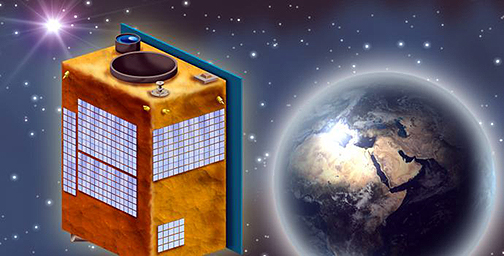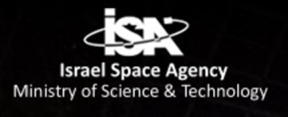
Artistic rendition of Israel's ULTRASAT smallsat.
Image is courtesy of the Israel Space Agency.
A posting at the Israel21c infosite reports that, weighing just about 160 kilograms (353 pounds), a new type of scientific satellite to be built in Israel will carry a telescope designed to observe the universe as it has not before been seen.
The ULTRASAT, projected to launch in 2023, will operate in an ultraviolet range of light, normally invisible to us, with a very large field of view.
Among the big questions to be answered: How do dense neutron stars form and later merge and emit gravitational waves? How do supermassive black holes rule their neighborhoods? How do stars explode? Where do the heavy elements in the universe come from? What are the properties of stars that could have habitable planets?
 The Weizmann Institute and the Israel Space Agency will begin working on the project in September. The German DESY Research Center of the Helmholtz Association pledged its support and cooperation for the initiative. Negotiations are also under way with other major space agencies to get ULTRASAT off the ground. The project is expected to cost some $70 million over a projected four years of detailed planning, construction and launch.
The Weizmann Institute and the Israel Space Agency will begin working on the project in September. The German DESY Research Center of the Helmholtz Association pledged its support and cooperation for the initiative. Negotiations are also under way with other major space agencies to get ULTRASAT off the ground. The project is expected to cost some $70 million over a projected four years of detailed planning, construction and launch.
Professor Eli Waxman of the Weizmann Institute of Science in Rehovot, Israel, stated this unique configuration will help to answer some of the big questions in astrophysics.
ISA Director Avi Blasberger added that the ULTRASAT spacecraft will be constructed by the Israeli industries and will put Israel —– and Israeli scientists and engineers — at the forefront of a global movement to explore the universe with small, affordable satellites.
Weizmann President Professor Daniel Zajfman noted that a small country — and a small satellite — can produce big results, even in exploring the wonders of distant outer space.

For all involved in the satellite and space industry and the various market segments that add value to these dynamic environments, the 2020 SmallSat Symposium is truly worth your consideration for attendance.
The SmallSat Symposium is hosted by Satnews Publishers which, since 1983, has been a provider of a satellite news, media and events. This information packed forum was created to enable you and your company to secure a larger portion of market share as well as to take part in the next stages of your company's or organization's growth.

The personal connections at the SmallSat Symposium enable attendees to network with established organizations, subject-matter experts as well as 'New Space' entrants.
The SmallSat Symposium will focus on new technologies and the business environment that is shaping the implementation of smallsat constellations, smallsat launchers, the challenges facing the smallsat developer and actors as well as the enormous benefits of these advanced technologies that will benefit our world.
This event assembles more than 100 diverse speakers, all of whom possess deep industry experience. Additionally, numerous opportunities exist to mingle and network with peers while enjoying exceptional, complimentary meals and refreshment breakfast.

